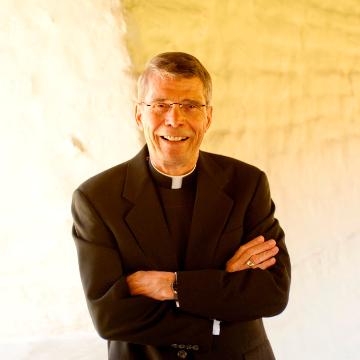
Can a Squirrel and a Monkey Be Friends?
Mark Twain tells the story of the differences he found between the animal world and the human world. Animals, he said, are more reasonable, and he proved it by teaching a cat and a dog to be friends, then putting them in a cage with a rabbit, whom they learned to accept. He gradually added a fox, a squirrel, a goose, and some doves, and finally a monkey.
He tried the same procedure with humans by putting in a cage a Roman Catholic from Tipperary and a Presbyterian from Aberdeen. Then a Greek Christian, a Muslim, a Methodist from Arkansas, a Buddhist and a Salvation Army Colonel from Wapping.
After a time, he checked the cage of animals; they were living quite peaceably together. When he checked the cage of humans, he found a gory chaos of turbans and fezzes and plaids and bones. No one left alive. And he says, “These Reasoning Animals had disagreed on a theological detail and carried the matter to a higher court.”
Why do our differences – theological, ethnic, nationalistic, political, whatever – result in conflict?
Twain’s story stands not simply as a critique of our penchant for religious persecution, but as a metaphor for all the frightful ways we treat one another’s differences. Why do our differences – theological, ethnic, nationalistic, political, whatever – result in conflict? Why is it we perceive the richness of God’s creation, its diversity, its continuing newness and creativity, as fodder for disagreement rather than as a cause for rejoicing? True, disagreements are real, and it does not help if they are shoved into a corner as if they do not exist, but as a source of violence? As an opportunity to parade our perceived superiority? As an easy slide into slander and discrimination? As an excuse for denying children the safety of asylum? As a sword against the children of Nigeria and against journalists specializing in satire? Never.
It is a fact of our human condition that we find it hard to trust God’s creative diversity. We want everyone to be like ourselves – or at last not too different. There’s no easy, no permanent solution to this obstinacy. But self-examination is important: in the quiet of our hearts, where we confront ourselves, our prejudices, our loves, do we see the world as a chaos of differences that are sources of separation, or as a diversity of riches that – except for the many species of moral evil - mirror the fathomless love of the Creator?
Faithfulness to a religious tradition is essential; discrimination in the name of religion is heartbreaking.
Especially sad is the testament we have handed down, through history, to all the future generations, to look askance at one another’s worship of God. Religion is a defining characteristic of the human personality, but so often we human beings have been unable to countenance a form of worship different from our own. Faithfulness to a religious tradition is essential; discrimination in the name of religion is heartbreaking. Too many have used religion as a cudgel rather than as an invitation to grace.
And that’s why Mark Twain’s cage of humans is so bloody – and so different from the cage where the squirrel and the monkey get along just fine.

